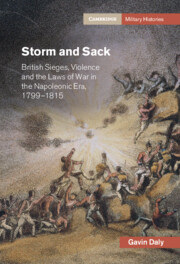Refine search
Actions for selected content:
11 results
9 - A Corruption Lens on Atrocity Crimes
- from Part III - A Corruption Lens on Human Rights-Related Issues
-
- Book:
- Fighting Grand Corruption
- Published online:
- 03 April 2025
- Print publication:
- 10 April 2025, pp 182-201
-
- Chapter
- Export citation

Profits and Persecution
- German Big Business in the Nazi Economy and the Holocaust
-
- Published online:
- 22 November 2024
- Print publication:
- 30 January 2025
5 - On Wellington’s Watch
-
- Book:
- Storm and Sack
- Published online:
- 29 September 2022
- Print publication:
- 06 October 2022, pp 165-198
-
- Chapter
- Export citation
Conclusion
-
- Book:
- Storm and Sack
- Published online:
- 29 September 2022
- Print publication:
- 06 October 2022, pp 269-277
-
- Chapter
- Export citation
Introduction
-
- Book:
- Storm and Sack
- Published online:
- 29 September 2022
- Print publication:
- 06 October 2022, pp 1-15
-
- Chapter
- Export citation
6 - Plunder
-
- Book:
- Storm and Sack
- Published online:
- 29 September 2022
- Print publication:
- 06 October 2022, pp 199-226
-
- Chapter
- Export citation

Storm and Sack
- British Sieges, Violence and the Laws of War in the Napoleonic Era, 1799–1815
-
- Published online:
- 29 September 2022
- Print publication:
- 06 October 2022
4 - Rome after the 455 Vandal Occupation
-
- Book:
- The Falls of Rome
- Published online:
- 04 September 2021
- Print publication:
- 09 September 2021, pp 148-196
-
- Chapter
- Export citation
5 - The Evacuation of East Prussia
-
- Book:
- Violence in Defeat
- Published online:
- 12 February 2021
- Print publication:
- 18 February 2021, pp 188-242
-
- Chapter
- Export citation
“For private or personal use”: The meaning of the special intent requirement in the war crime of pillage under the Rome Statute of the International Criminal Court
-
- Journal:
- International Review of the Red Cross / Volume 102 / Issue 915 / December 2020
- Published online by Cambridge University Press:
- 04 November 2021, pp. 1249-1272
- Print publication:
- December 2020
-
- Article
- Export citation
32 - Visualising Violence in Reformation Europe
- from Part VII - Representations and Constructions of Violence
-
-
- Book:
- The Cambridge World History of Violence
- Published online:
- 13 March 2020
- Print publication:
- 26 March 2020, pp 634-659
-
- Chapter
- Export citation
